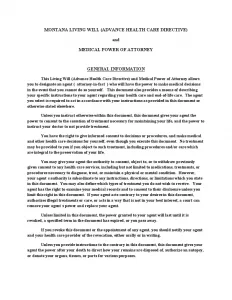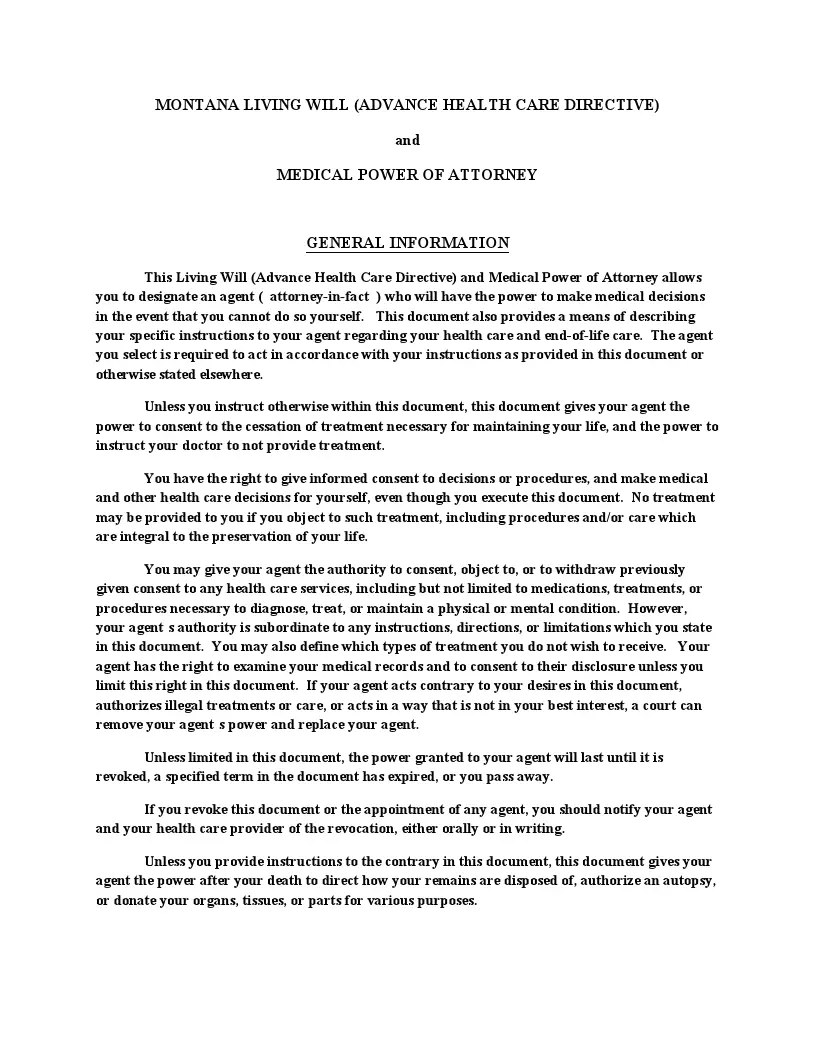Free Montana Living Will Form
A living will in Montana, officially recognized as a “Declaration for a Natural Death,” is a legal document that allows individuals to express their preferences about medical treatment in situations where they become incapacitated and unable to communicate their decisions. A living will template is relevant in end-of-life scenarios, where the individual may wish to outline specific instructions regarding the use or non-use of life-sustaining treatments.
Montana’s laws enable a person to declare their wishes concerning medical treatments that might extend their life in the case of terminal illness or if they are in a persistent vegetative state. This includes decisions on resuscitation, mechanical ventilation, and other forms of life support.
The Montana living will form doesn’t take effect immediately but only becomes operative when a physician diagnoses a person as being in a terminal condition or a state of permanent unconsciousness, and they are unable to communicate their wishes directly.
Signing Requirements and Laws
In Montana, the legal requirements for signing a living will, or a “Declaration for a Natural Death,” are specified under Title 50, Chapter 9, Part 1 of the Montana Code Annotated (MCA). The provisions under this title ensure that the document meets all legal standards to be recognized as valid and enforceable. Compliance with these requirements is crucial for the document to be legally effective in directing healthcare decisions when the declarant is incapacitated.
The individual must be at least 18 years old and have a sound mind when signing the declaration (MCA 50-9-103). The declaration must be signed in the presence of two qualified witnesses. The witnesses must be adults and cannot be:
- Related to the declarant by blood, marriage, or adoption,
- Entitled to any portion of the estate of the declarant upon death under a will or codicil to it or by operation of law,
- Directly financially responsible for the declarant’s medical care,
- Or a healthcare provider who is a direct care provider to the declarant or an employee of a healthcare facility where the declarant is a patient.
The living will must be voluntarily executed without coercion or undue influence. The Montana statutes also emphasize the importance of updating or revoking the declaration if the declarant’s wishes change over time. This can be done by executing a new declaration or physically destroying the original document to indicate the intent to revoke it (MCA 50-9-104).
Montana Living Will Form Details
| Document Name | Montana Living Will Form |
| State Form Name | Montana Declaration for a Natural Death |
| Signing Requirements | Two Witnesses |
| Validity Requirements | Section 50-9-103 |
| State Laws: Montana Code Annotated, Title 50, Chapter 9 | |

Steps to Fill Out the Form
Following these steps, you can complete the Montana Declaration for a Natural Death to effectively communicate your healthcare preferences and appoint a trusted individual to oversee your medical care.
1. Enter Your Personal Information
Start by providing your full name and asserting that you are of sound mind. This field is crucial as it confirms your capacity to make such a declaration.
2. Specify Your Wishes Regarding Life-Sustaining Procedures
Clearly state that if you are diagnosed with a terminal illness or condition, you wish for life-sustaining procedures to be withheld or withdrawn. Make it clear that you wish to die naturally, with only comfort care administered to ease any pain or discomfort.
3. Acknowledge the Implications of Your Decision
Confirm that you understand the full implications of your decision. This statement is crucial as it signifies that you are fully aware of the consequences of refusing medical or surgical treatment.
4. Declare the Validity Period
Indicate that your living will remains valid until you decide to revoke it. This part establishes the document’s enduring effect unless you explicitly withdraw it.
5. Sign and Date the Form
Sign your name and date the form to execute the declaration legally. This act finalizes your intent and must be done in the presence of witnesses for additional legal standing.
6. Complete Witness Formalities
Have two witnesses sign the document, confirming that they observed you signing the declaration and that you did so voluntarily and under no duress. Provide the addresses of the witnesses to complete this section, which adds another layer of verification to the document.
7. Enter Additional Personal Details
Fill in your city, county, state of residence, date of birth, and social security number. These details are necessary to fully identify and differentiate you from others, especially in legal and medical settings.

Below are various other Montana templates completed by our users. Try our simple builder to customize these forms to your preferences.
Other Living Will Forms by State
